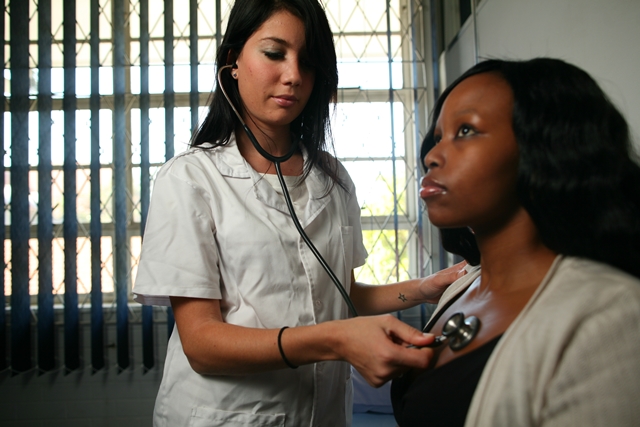Catering to the health needs of the community is the aim behind the launch of the new Kenneth Gardens Wellness Centre to be launched at the Lower Kenneth Gardens, Umbilo, Durban, on Wednesday, 25 February 2015.
This community project has been made possible thanks to the collaboration of the Urban Futures Centre at DUT (UFC@DUT), non profit organisations (NPOs) at Kenneth Gardens, the Glenridge Church as well as DUT’s Homeopathy and Food and Nutrition departments.
Kenneth Gardens in Umbilo is the largest municipal housing estate in the city of Durban. It provides subsidised housing to approximately 1500 to 1800 individuals. A large portion of the residents have at least one member of their family with a serious physical or mental illness. The DUT staff and students from the Homeopathy Department have been running a weekly clinic, every Wednesday from 9am to 12h00, in the area since 2011. The clinic will now be launched as the new Wellness Centre which will move to the Kenneth Gardens Housing Estate in a previously dilapidated building. This once dilapidated building has been completely renovated, with huge assistance from community partners such as the Glenridge Church.
The new Wellness Centre will ultimately combine allopathic and alternative health care services in the facility. At present, the very well supported homeopathic clinic in Kenneth Gardens is the only homeopathy clinic existing within a low income housing estate in the country. The Wellness Centre is run Dr Ingrid Couchman from the University’s Homeopathy Department together with Khanyi Sibiya, the founder of the home based care NPO in Kenneth Gardens. The Food Nutrition Department is also very active in the clinic and is supervised by Dr Carin Napier and run by DTech food and nutrition student, Andile Mtolo.
Dr Couchman, said, “We run a homeopathic day clinic so we see patients every Wednesday, we see all conditions, and if we are unable to treat them and we feel that they need a referral, we then refer them to the various hospitals. I sit with a selection of final year homeopathy students while they are consulting. They then discuss the case with me and then we dispense medication.” She added that on average, they see 20 patients a week. “We have regulars as well. It’s not just a clinic. It’s also a place for people to come and also talk to the nutritionist,” she said.
DTech Food and Nutrition student, Andile Mtolo, who is based at the Food and Nutrition section of the clinic, said he is also currently doing his research on Kenneth Gardens. “When we help people we can see the reaction immediately. The patients that come through every Wednesday keep coming back and we have built this relationship with the community and can see that they enjoy coming to the clinic. They know that they get the best advice and we are here for them whenever they need. It’s all about building a community family. The fact that we have people coming every week without fail means that it is something very effective, otherwise they wouldn’t be coming back if we were not doing a good job. Our main aim is not just to help in terms of the food and nutritional side. We also educate patients and their families on health education and healthy eating,” he said.
Professor Monique Marks who currently heads the newly established Urban Futures Centre at DUT said, “We have a regular basis of about 120 users of the clinic which is quite phenomenal in a low-income community where homeopathy is a foreign idea. People who generally use homeopathy are middle class but people from poorer communities tend to go to public hospitals. Kenneth Gardens has now become a service learning site for a particular group of students and these students are getting to know their community through home visits and other projects in the Kenneth Gardens area. It is basing healthcare at the most local levels so ultimately the aim of this year (2015) is to try and get the clinic registered in order to dispense medication, which is very important for the elderly and sick people.”
Prof Marks urged community members, stakeholders and businesses to donate any old medical equipment such as old blood pressure machines, a comfortable couch or pictures to put up on the walls to make the centre look nice and cosy. Prof Marks can be contacted on (031) 373 2180 or via email: moniquem@dut.ac.za
– Waheeda Peters
Pictured: Homeopathy in action at DUT.


